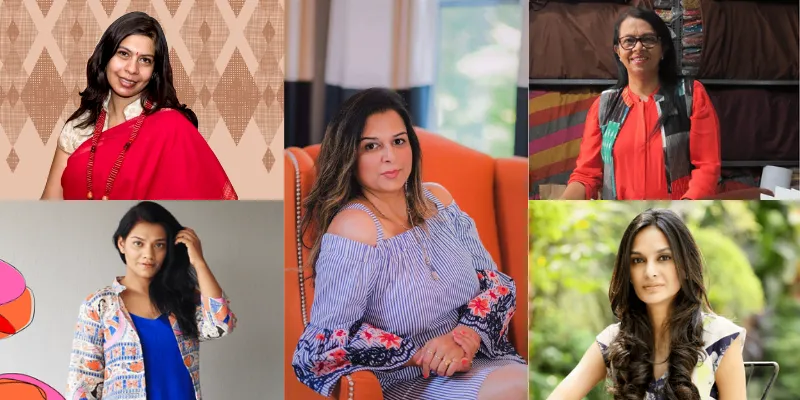5 women entrepreneurs who are bringing eco-friendly, sustainable fashion to Indian customers
These five women entrepreneurs are innovating and upskilling to revolutionise sustainable fashion in India and the world over.
When asked about pollution, people would say it is caused due to various factors, ranging from plastics, oil spillage, smog, etc. But many seldom forget that waste clothes account for a significant proportion of this problem.
Fashion is one of the most polluting industries in the world. Clothes happen to be one of the most common items people purchase, and the average number of clothes that an individual buys is increasing every year, thanks to the retail boom in recent years.
According to McArthur Foundation, in 2015, textiles production led to 1.2 billion tonnes of carbon dioxide emissions, more than that of maritime shipping and international flights combined. In fact, textile dyeing and associated activities contributed to 20 percent of all industrial water pollution.
While some brands are taking a step towards providing sustainable fashion, about 60 percent of millennials are also inclining towards shopping sustainably, as per the findings by Fabrik Brands.
Here are five women entrepreneurs that are innovating and upskilling to revolutionise sustainable fashion in India and the world over.

(From L to R clockwise) Sujata Chatterjee, Founder of Twirl.Store; Premal Badiani, Founder of The Label and Badiani New York; Bhavini N Parikh, Founder of Bunko Junko; Sweta Tantia, Founder of Garo and Tahweave; Madhurima Bhattacharjee, Founder of Madhurima Bhattacharjee
Twirl.store by Sujata Chatterjee
Sujata Chatterjee started Twirl.store in 2017. The brand signifies a ‘sustainable circle’ and aims to “reduce cloth wastage, encourage women empowerment, conserve natural resources like water, and to meet the clothing needs of the less fortunate.”
From consumers with overflowing cupboards to millions of people who can barely access basic clothing, Sujata is on a mission to solve the problems on both sides of the societal pyramid.
“Fashion, as just a linear line of consumption, bothered me, and I knew it was necessary to make retail a sustainable circle. I felt deeply about the problem but realised there was not much being done about it. So, I decided to be the change that I want to see,” she told HerStory earlier.
Twirl collects clothes from people, rewards them with redeemable points, and upcycles the clothes or provides to the needy through donation drives conducted regularly by various NGOs.
Since West Bengal has a thriving handloom culture, with many local women part of this vocation, Sujata is leveraging the upcycling of fabric and product manufacturing done by these women, providing them with a source of livelihood.
The Label and Badiani New York by Premal Badiani
Premal Badiani — a US-based Indian fashion designer — came into the global limelight in 2018 when she showcased a fashionable and feminine The Valentia Collection, designed to honour breast cancer fighters and survivors.
A recipient of the American Academy Global Award in 2019, Premal is recognised for introducing a 360-degree virtual eco-friendly runaway at the New York Fashion Week.
In fact, she has been awarded the versatile designer award by Fortune Magazine for being a “pioneer in promoting sustainable fashion in luxury wear.”
“It is this dynamic of ‘trendy through necessity’ that makes sustainable fashion such an exciting area right now. Adopting sustainable fashion is a lifestyle choice, and we need to realise that caring about the planet is not a seasonal choice but needs to be done all year round. The key is to keep sustainable fashion affordable. Consumption patterns have changed among influencers, who are spreading awareness about sustainable fashion among the masses. Due to these shifts, more people are now willing to make these positive lifestyle choices,” she said.
Before embarking on her entrepreneurial journey, Premal worked as an M&A consultant for a major financial institution. She studied fashion at the London School of Fashion and used her skills and passion to make a positive impact on society.
Besides being a full-time designer, a Hollywood costume designer, a writer, philanthropist, certified life coach, and a mom to twins, Permal also serves on the mentor board of some fashion institutes.
Her brands target customers who look for ‘luxuriously, fashionable, and comfortable’ outfits, catering to major markets in the US, the UK, India, and Dubai.
Bunko Junko by Bhavini N Parikh
Sustainable fashion brand Bunko Junko was started in 2017 by Bhavini N Parikh. The brand repurposes pre-consumed textile waste to create products for everyday use, including kurtas, dresses, jackets, rugs, bedspreads, wall hangings, and accessories, such as laptop bags, clutches, earrings, and bangles.
Bhavini has worked with over 1,000 women from socio-economically challenged groups to complete embroidery and textile surface ornamentation work orders for big brands like Shoppers Stop and AND Fashion.
“At first, we were making garments for big brands. But, over time, we noticed that there was a lot of fabric waste on the production floor, ending up in landfills. That got me thinking, and I began researching sustainable, ethical fashion.” Bhavini said on the genesis of Bunko Junko.
Besides manufacturing and selling upcycled garments, accessories, and home furnishings, Bunko Junko also takes customised orders for individuals and businesses.
“Our experience at Bunko Junko has shown that upcycling of textile waste is not only good for the environment but can also be a means to contribute to socio-economic upliftment of communities. That’s why we believe sustainability isn’t a next-generation job or just a trend. For us, it’s a mission. It’s our future,” Bhavini said.
Madhurima Bhattacharjee by Madhurima Bhattacharjee
Madhurima Bhattacharjee has been featured in the Femina Magazine as one of the top sustainable labels to wear in 2019.
An engineer, Madhurima quit her full-time job at Huawei to pursue her passion and skill for fashion. She started by showcasing her pieces at exhibitions and pop-up events in Bengaluru. In fact, her first break came when fashion label Jaypore agreed to collaborate with her.
Around the same time, California-based startup The Woven Threads also approached her to showcase her dresses and separates at Flying Solo — an event that hosts independent sustainable designers across the globe in SoHo, New York — as a part of its pre-fall collection.
“Whenever I work on a collection of dresses, I use leftover fabric to do patchwork jackets for the next season. I believe you can sell sustainability if you innovate with it in a way it looks appealing. It will also give you higher returns,” she said.
Garo and Tahweave by Sweta Tantia
Having grown amidst sashay fabrics that her father's garment export factory would export to Japan, Sweta Tantia had been fascinated by the fashion industry from a young age.
Therefore, it was only natural for her to pursue a formal education from NIFT, Kolkata, and later pursue a master’s from the London School of Fashion.
At present, Sweta is backed by a team of over 30 weavers and has dressed celebrities, including Madhuri Dixit Nene, Sania Mirza, and Dia Mirza.
Her brand and collection have already made it to five seasons of Lakme Fashion Week.
Sweta believes that supporting the livelihood of weavers is crucial. Besides the salaries for weavers, a part of the revenue from Tahweave’s sales are spent on improvising the flooring and building sheds for their homes during the rainy season. In fact, her efforts were recognised by the Textile Minister of the West Bengal government.
Edited by Suman Singh











